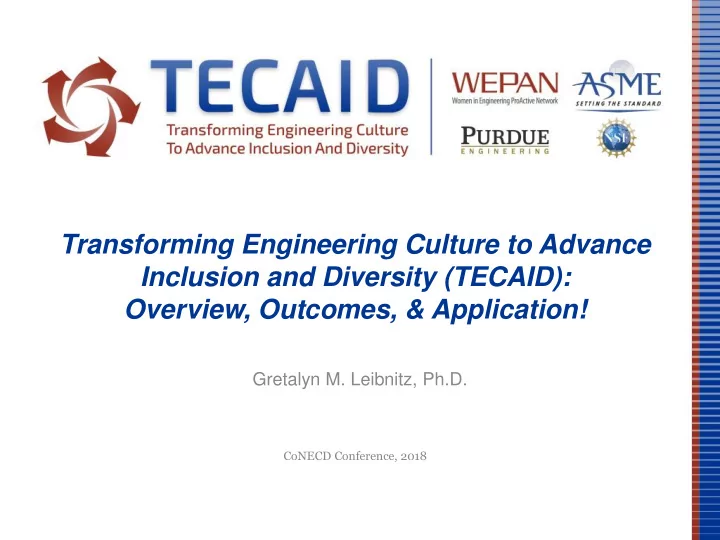

Transforming Engineering Culture to Advance Inclusion and Diversity (TECAID): Overview, Outcomes, & Application! Gretalyn M. Leibnitz, Ph.D. CoNECD Conference, 2018
“Head, Heart, Hands” TECAID Outcomes Re -Cap Knowledge and Use of Diversity, Equity and Inclusion (DEI) Concepts Confidence in Leadership Skills DEI Action
Example: Increased Knowledge of Diversity Concepts “Micro - Inequities” Awareness AFTER BEFORE 59% 96%
Example: Increased Knowledge of Diversity Concepts “Micro - Inequities” Awareness Informs Interactions AFTER BEFORE 36% 69%
Example: Increased Confidence • How to engage in productive AFTER change processes • Leadership >90% skills • How to create organizational change
Example: DEI Action Taken Within Last 6 • DEI action Months taken (Participants 100% taking no action dropped from 37% to 0%)
What do TECAID Results Mean for YOUR Work? • T eams & Time • E ducation & Engagement • C ommunity & Commitment • A ssessment & Awareness • I ndividual & Inimitable • D esire & Development
Resources: Toolkit & Worksheet
Resources: TECAID Model & Graphic
Resources: Case Studies Working as a team on DEI Issues Gathering strategic information for planning DEI change Effectively navigating conflict while engaging in DEI change efforts
Think-Pair- Share: What’s Your Motivation? • Why does having a diverse, equitable, and inclusive engineering department culture matter to you ?
Discussion: Ground Work • Where are you already gaining ground in your desire to create DEI-related change? (can choose multiple) – Department leadership support – Collegial support – Expert assistance available (local & external) – Experience in using conflict constructively – Awareness of conditions (persistence, politic, time, accountability for change…) for sustaining long term effort – Other? (Put into chat box)
Resources: Case Studies
Resources: Case Studies
Think & Pair Exercise: Key Action Build a DEI Change Team • Who do you consider as potential allies? (Pick all that apply) • Department head/dean • Tenure-line/tenured faculty • Clinical faculty • DEI and organizational change experts/leaders • People-with-identities-different-than-your-own • Others? (Put in Chat box)
Think-Pair-Share: Key Action Identify DEI Concerns & Vision • Describe your ideal diverse, equitable, and inclusive department… (what does it look like if it is fixed?)
Resources: Case Studies
Think & Write: Key Action-- Learn About DEI-Focused Department Culture Change Think & Write: What DEI resources are available to you on your campus? – diversity workshops and seminars – facilitated diversity-related discussions – diversity-themed coursework – diversity-focused offices or administrators – diversity-focused professional societies – diversity-focused student groups/student services – diversity-focused faculty groups – diversity-focused staff groups – faculty/staff hiring policies – other diversity-related policies
Handout: Force Field Analysis & Worksheet
CHAT: Key Action Plan & Implement DEI Change • What forces exist currently exist in your department that make DEI change possible? • What forces currently exist that you will need to overcome in your department to make change possible?
Key “Take - Away(s)” for Change Agents • It’s not enough to have knowledge and a plan – even a good one! Successful change depends on laying the groundwork and involving people in the process. • Change is a dynamic, complex, and multi-faceted process that requires change leaders and change plans to continually evolve and grow. • The overall process can be mapped, but the details are highly contextualized; an effective culture change process is locally derived within each of these broad arenas.
Resources: Website
Gretal Leibnitz, Ph.D. (TECAID PI) Leibnitz@wepan.org
Recommend
More recommend